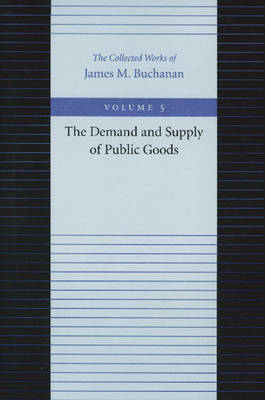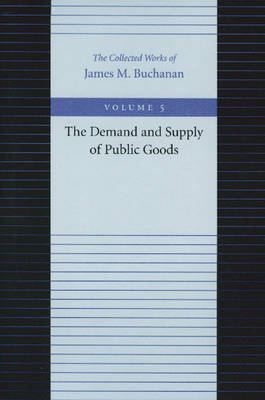
- Retrait gratuit dans votre magasin Club
- 7.000.000 titres dans notre catalogue
- Payer en toute sécurité
- Toujours un magasin près de chez vous
- Retrait gratuit dans votre magasin Club
- 7.000.0000 titres dans notre catalogue
- Payer en toute sécurité
- Toujours un magasin près de chez vous
Description
Public-goods theory constituted a major element in James M. Buchanan's research agenda throughout the 1960s. The Demand and Supply of Public Goods is a major part of that work.
At the time that Buchanan was elaborating on his theories of public goods, the prevailing trend in public economics was the emergence of public-expenditure theory, which attempted to form a comprehensive theory of the state around the notion of market failure.
The Demand and Supply of Public Goods established Buchanan's broad purpose of explicitly comparing market performance with political performance. As such, the book is an important part of Buchanan's contractarian theory of the "productive state."
Conceived originally as a series of lectures given at Cambridge University in 1961 and 1962, The Demand and Supply of Public Goods is written for students, but is in no way a textbook of dry pedagogy. Instead, as Geoffrey Brennan writes in the foreword, "What Buchanan provides here is a clear statement of the contractarian approach to public goods problems, very much in the 'voluntary exchange' tradition of Wicksell and Lindhal."
James M. Buchanan (1919-2013) was an eminent economist who won the Alfred Nobel Memorial Prize in Economic Sciences in 1986 and was considered one of the greatest scholars of liberty in the twentieth century.
Spécifications
Parties prenantes
- Auteur(s) :
- Editeur:
Contenu
- Nombre de pages :
- 220
- Langue:
- Anglais
- Collection :
- Tome:
- n° 5
Caractéristiques
- EAN:
- 9780865972223
- Date de parution :
- 01-10-99
- Format:
- Livre broché
- Format numérique:
- Trade paperback (VS)
- Dimensions :
- 152 mm x 229 mm
- Poids :
- 385 g

Les avis
Nous publions uniquement les avis qui respectent les conditions requises. Consultez nos conditions pour les avis.






